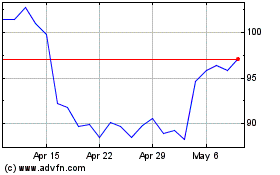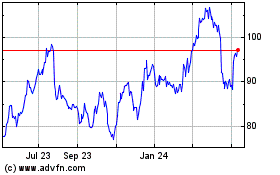By Brent Kendall and Anne Steele
WASHINGTON -- The Justice Department is preparing to take legal
action against Live Nation Entertainment Inc. on allegations the
company has sought to strong-arm concert venues into using its
dominant Ticketmaster subsidiary, according to people familiar with
the matter.
The department believes the concert-promotion giant's conduct
has violated the merger settlement Live Nation and Ticketmaster
reached with the government in 2010, the people said. Under that
agreement, the department's antitrust division allowed the
companies to combine, but required them to abide by conditions
designed to keep consumer prices in check by preserving competition
in the music and ticketing industries.
As ticket prices have risen, critics have questioned whether the
settlement has worked as intended. It is due to expire next year,
but the Justice Department now plans to ask a judge to extend the
restrictions by several years and prohibit the alleged coercive
conduct by Live Nation, the people said.
Live Nation's chief executive has publicly denied that the
company has violated its agreement. The company and the Justice
Department have engaged in talks but haven't settled their
differences, people familiar with the matter said.
Details about the department's specific concerns couldn't
immediately be learned.
The Live Nation-Ticketmaster merger consolidated two of the most
powerful forces in the music industry. As the world's largest
concert promoter, Live Nation organizes live music events --
booking talent, securing venues, setting ticket prices and
marketing shows. It has also built a robust artist-management
business.
The merger faced opposition at the time it was announced in
2009, and the Obama-era Justice Department's decision to allow the
deal with a settlement wasn't well-received in some industry and
consumer circles. Critics who say U.S. antitrust enforcement has
been too lax have often pointed to the merger as one where the
government should have taken a harder line to protect
consumers.
In the past decade, and particularly over the last few years,
ticket prices have soared -- increasing by nearly 50% since 2009 to
$92.42 on average for the top 100 tours world-wide, according to
Pollstar.
The settlement, known as a consent decree, forbids Live Nation
from forcing venues that want to book the concert promoter's tours
to use Ticketmaster for those shows, and from retaliating when
venues choose to use a ticketing competitor instead.
The deal also required Ticketmaster to license its technology to
Anschutz Entertainment Group, the distant No. 2 concert promoter,
to build a competitive ticketing platform. That ticketing service,
AXS, has had limited success outside of AEG's own venues.
Assistant Attorney General Makan Delrahim, the Justice
Department's antitrust chief, confirmed during a September Senate
hearing that the department was investigating allegations that Live
Nation had been violating the decree.
Typically, venues ranging from nightclubs and theaters to arenas
and stadiums enter long-term contracts giving a ticketing provider
the exclusive right to sell tickets to any event they host.
Ticketmaster holds an estimated 80% of the market, according to
people in the concert industry. Over the years, Live Nation's
competitors have accused it of using its market power as a concert
promoter and artist manager to coerce venues into using
Ticketmaster or risk losing out on lucrative bookings.
While in theory advances in new technology have made it easier
for other ticketing companies to challenge Ticketmaster, in
practice few venues have defected from their longstanding contracts
with the giant, according to people in the industry. Almost 10
years since the decree was put in place, Ticketmaster has no
serious competitor.
Live Nation previously dismissed the calls for investigation as
based on a misunderstanding of the decree and ticketing-industry
dynamics. Speaking at a conference in mid-September, Live Nation
Chief Executive Michael Rapino said the decree allows the company
to make decisions that are "right for our business," and that
booking a Live Nation tour date at a venue that uses a ticketing
provider other than Ticketmaster may not make economic sense for
the company. He acknowledged that competitors have raised flags to
the Justice Department, but said the company had never been found
to engage in wrongdoing.
"We have no fear that we have any systematic issues. We're very
compliant," he said.
The company has been facing fire from Congress as well as the
Justice Department.
In August, Sens. Richard Blumenthal (D., Conn.) and Amy
Klobuchar (D., Minn.) asked DOJ to investigate the state of
competition in ticketing, focusing on the Live Nation-Ticketmaster
merger.
Last week, four House lawmakers sent a letter to the department
that expressed concerns about the merger, saying, "Our constituents
are facing significantly increased live event prices and a lack of
meaningful alternatives to purchase tickets to live events."
The signatories were Reps. Ken Buck (R., Colo.), Matt Gaetz (R.,
Fla.), Lucy McBath (D., Ga.) and James Sensenbrenner (R.,
Wis.).
The Justice Department rarely has sued companies for alleged
violations of antitrust consent decrees, but Mr. Delrahim has
publicly voiced the need for companies to abide by their
commitments. He has called for changes in decree language that
would make it easier for the department to establish violations in
court, and to force merged companies to pay the government's costs
in enforcing merger settlements.
The Live Nation decree also has arisen recently in a second
context with the Justice Department. The company has asked the DOJ
for permission to explore a transaction involving Rival, a
ticketing company launched last year by former Ticketmaster CEO
Nathan Hubbard, according to people familiar with the matter.
The decree requires Live Nation to give notice of any potential
transactions of a ticketing company so the department can
investigate the competitive effects of any such deal.
Mr. Hubbard led Ticketmaster for four years after the
merger.
Mr. Hubbard, whose efforts attracted high-profile backers
including top Silicon Valley venture-capital firm Andreessen
Horowitz and Santa Monica, Calif.-based Upfront Ventures,
envisioned fully digitizing tickets could address inefficiencies in
how live events operate, and make them safer, by connecting
identity, payment and location data.
He built the aptly named Rival to be what he hoped would be a
serious competitor in ticketing.
Write to Brent Kendall at brent.kendall@wsj.com and Anne Steele
at Anne.Steele@wsj.com
(END) Dow Jones Newswires
December 13, 2019 16:21 ET (21:21 GMT)
Copyright (c) 2019 Dow Jones & Company, Inc.
Live Nation Entertainment (NYSE:LYV)
Historical Stock Chart
From Mar 2024 to Apr 2024

Live Nation Entertainment (NYSE:LYV)
Historical Stock Chart
From Apr 2023 to Apr 2024
